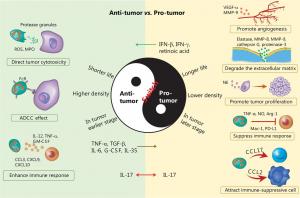Tumor allies or foes? Unraveling neutrophil roles in cancer
GA, UNITED STATES, August 1, 2025 /EINPresswire.com/ -- Neutrophils, once considered simple foot soldiers of innate immunity, are now recognized as complex players in cancer. This review highlights how these cells, which typically defend the body from infection, can paradoxically support tumor progression through promoting angiogenesis, immune suppression, and metastasis. Yet, they also possess tumor-fighting capabilities under certain conditions. The dual nature of tumor-associated neutrophils (TANs)—either aiding or attacking cancer—depends on various signals within the tumor microenvironment. Understanding this plasticity opens doors to novel therapeutic strategies that can suppress their tumor-promoting roles while enhancing their anti-tumor potential.
Neutrophils are the most abundant type of white blood cells, critical for immune defense and inflammation control. Traditionally, their role in cancer was seen as minor, but emerging evidence reveals that neutrophils are deeply involved in all stages of tumor development. They can promote tumor growth, facilitate metastasis, and suppress the immune system—yet also mediate direct tumor cell killing and support T cell responses. This complexity stems from their ability to adopt distinct functional states influenced by the tumor microenvironment, cytokines, and systemic factors. Due to these challenges, there is a need for in-depth research on how to harness neutrophil plasticity for cancer therapy.
A new review published in Cancer Biology & Medicine by researchers from Zhejiang University and Wenzhou Medical University, comprehensively examines the multifaceted role of neutrophils in cancer. The authors explore how tumor-associated neutrophils (TANs) can be reprogrammed by their environment to either support or suppress tumor growth. By mapping the mechanisms of neutrophil polarization, chemotaxis, and interactions with tumor and immune cells, the study sheds light on promising therapeutic targets for cancer treatment.
The review outlines how neutrophils can be polarized into either anti-tumor (N1) or pro-tumor (N2) states. Tumor-derived signals like TGF-β, IL-6, and granulocyte-CSF (G-CSF) push neutrophils toward the N2 state, which enhances angiogenesis, suppresses cytotoxic T cells, and promotes metastasis. In contrast, cytokines like IFN-β and retinoic acid can induce the N1 phenotype, boosting immune surveillance and direct tumor cell killing. Neutrophils also engage in antibody-dependent cytotoxicity and can act as antigen-presenting cells under specific conditions. However, their role in metastasis is particularly complex—helping cancer cells survive in circulation, seed distant organs, and establish pre-metastatic niches. Therapies targeting neutrophil recruitment, such as CXCR2 and c-MET inhibitors, as well as strategies reprogramming TANs via STAT3 or TGF-β blockade, show potential in preclinical and early clinical studies. The short lifespan and plasticity of neutrophils, however, pose substantial challenges for therapeutic manipulation.
"Neutrophils are no longer seen as mere bystanders in cancer. Their dual nature makes them both a challenge and an opportunity in cancer therapy," said Dr. Chenghui Yang, corresponding author of the study. "Our review emphasizes the urgent need to better understand the factors driving neutrophil polarization. Future therapies will likely focus on re-educating these cells to tip the balance in favor of tumor suppression."
This review sets the stage for designing neutrophil-targeted therapies in oncology. By selectively inhibiting tumor-promoting neutrophils or reprogramming them into anti-tumor phenotypes, researchers hope to boost the effectiveness of immunotherapies. Drug strategies involving TGF-β inhibitors, CXCR2 antagonists, or nanoparticle-based delivery systems are already in early-phase trials. Additionally, blocking neutrophil-mediated pre-metastatic niche formation may help prevent cancer recurrence. As researchers continue to decode neutrophil behavior across different cancers and tumor stages, personalized immune interventions leveraging these "double agents" of immunity may soon become a cornerstone of precision oncology.
References
DOI
10.20892/j.issn.2095-3941.2025.0023
Original Source URL
https://doi.org/10.20892/j.issn.2095-3941.2025.0023
Funding information
This work was supported by grants from the National Natural Science Foundation of China (Grant Nos. 82273449 and 82203663), the Zhejiang Provincial Natural Science Foundation of China (Grant No. LQ23H160013), and the Medical and Health Science and Technology Project of Zhejiang Province (Grant Nos. 2024KY1039 and 2024KY1250).
Lucy Wang
BioDesign Research
email us here
Legal Disclaimer:
EIN Presswire provides this news content "as is" without warranty of any kind. We do not accept any responsibility or liability for the accuracy, content, images, videos, licenses, completeness, legality, or reliability of the information contained in this article. If you have any complaints or copyright issues related to this article, kindly contact the author above.

